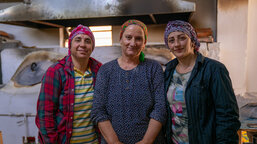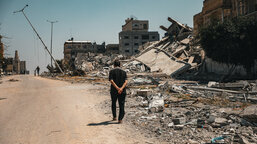Humanitarian crises are reaching alarming proportions. Last year was one of the most brutal on record for civilians in conflict zones, and humanitarian organisations warn that 2025 could be even worse. It is estimated that up to 305 million people will need humanitarian assistance this year. Let's take a look at six crises and conflicts that need attention this year. From Syria to Gaza, Ukraine and Sudan to the climate crisis.
1. Syria
After nearly fourteen years of devastating civil war, Syria saw significant changes towards the end of the year. While the fall of Bashar al-Assad's government means hope for a better future for many Syrians, humanitarian aid remains badly needed. It is estimated that 16.7 million people, more than 70 per cent of the total population of Syria, will need humanitarian assistance this year. Basic infrastructure has been destroyed and the health sector has long been on the verge of collapse. The country is suffering from a widespread economic crisis and food shortages are threatened due to a prolonged drought.
More than 7 million internally displaced people remain in Syria and have often left their homes repeatedly. The situation is most critical in the north-west of the country. This is where Caritas Czech Republic has been helping for a long time. We have provided decent accommodation and health care to people who have lost their homes. Last year, we repaired water sources damaged by the war and ensured access to clean water for the local population. We also provide psychological support and run awareness campaigns to improve health.
2. Gaza
More women and children have been killed in Gaza over the past year than in any other conflict over the same period in the last two decades. It is one of the most devastating humanitarian crises in the world. More than half of the homes, and most schools and health facilities have been damaged or destroyed. In the past year, more than 90 per cent of Gaza's 1.9 million residents have had to flee their homes without a safe place to hide.
Since the beginning of the war, up to 46,000 Gazans have been killed and over 100,000 injured. Gaza currently has the highest number of children with amputated limbs ever. In the first months of the conflict, more than ten children lost one or both legs every day.
The local population suffers from limited access to basic needs such as food, water and healthcare. There have also been long-standing violations of international humanitarian law and attacks on aid workers and health workers in Gaza. The situation is also having a negative impact on the West Bank, where tensions are rising, violence is escalating and the economic situation is deteriorating significantly.
The temporary ceasefire declared in January brings hope and increased humanitarian aid deliveries, but the needs in Gaza remain enormous.
In both Gaza and the West Bank, Caritas is helping to provide humanitarian assistance and primary health care and psychosocial support.
3. Ukraine
The war in Ukraine, which has been ongoing since 2014 and which escalated into a full-scale invasion in 2022, continues to cause widespread devastation and immeasurable suffering for the Ukrainian people. This year, 12.7 million people will need humanitarian assistance in Ukraine. The ongoing conflict is destroying the energy infrastructure, which is having a severe impact on the lives of the local population. They face power and heating cuts in the winter months, as well as limited access to health care. People close to the frontline face long-term trauma, with lasting consequences.
More than 3.6 million remain internally displaced, most of them living in relatively safer areas in the west of the country. This is where Caritas Czech Republic is helping, providing decent and safe accommodation to the displaced and supporting them to rebuild their lives and livelihoods despite the difficult conditions. In cooperation with partners, we are providing urgent humanitarian assistance, including fuel during the winter months, to people near the front line.
4. Democratic Republic of Congo
The Democratic Republic of Congo is facing one of the world's most protracted crises, caused by armed conflict, economic crisis, climate shocks and persistent disease epidemics. An estimated 21.2 million local people will need humanitarian assistance in 2025. Conflicts between government forces and non-government armed groups, most notably the M23 rebel group, have displaced 6.3 million people. This makes the Democratic Republic of Congo the country with the second largest displaced population in Africa. The ceasefire concluded with the main rebel group last August has been repeatedly violated and the security situation is therefore not expected to improve this year.
The country's health system is under constant pressure due to persistent epidemics and lack of resources. The Democratic Republic of Congo is one of the countries with the largest number of people suffering from acute food shortages, with more than 25 million people facing severe food insecurity. Children are most at risk - more than one million children under five suffer from severe acute malnutrition and one in two children under five suffer from chronic malnutrition, with fatal consequences for their health and future.
The situation in the country is also exacerbated by the impact of climate change - flooding has affected millions of people in recent years and severely disrupted the livelihoods of local people.
Armed conflict and instability in Congo have long forced local people to seek safety beyond their borders. Caritas Czech Republic is helping refugees from the Democratic Republic of Congo in Zambia. We provide support for students to continue their university studies, while also helping refugees to start their own businesses to help them make a living in their new country. For example, tailoring workshops and ICT centre have been set up thanks to our support.
5. Sudan
After 21 months of conflict, Sudan is one of the worst places to live in the world. Fighting between the Sudanese army (Sudanese Armed Forces, SAF) and the paramilitary Rapid Support Forces (RSF) has caused a huge humanitarian crisis and killed over 61,000 people. According to available reports, most of them died of disease and hunger, while 26,000 were killed as a direct result of the fighting.
Nearly two-thirds of Sudan's population, at 30.4 million, is in need of humanitarian assistance. The need for aid has skyrocketed from 15.8 million people at the start of the conflict in April 2023. 11 million people in Sudan are internally displaced by the crisis and 3 million have fled to neighbouring countries. It is now the largest ever migration crisis in the world.
Children in Sudan are particularly vulnerable: they make up more than half of the displaced population, 17 million children are out of school, and school-age girls face additional threats - including forced marriage, circumcision and sexual abuse.
6. The climate crisis
One of the biggest contemporary crises has long been the climate crisis. The year 2024 was the warmest on record. The world is dangerously close to the 1.5°C warming threshold, with catastrophic impacts on the lives of millions of people.
The climate crisis is hitting the Middle East and North Africa particularly hard, but water shortages are affecting many other countries, from Peru to Kenya, Syria, Afghanistan and Somalia.
Farmers in Zambia last year experienced one of the worst crop failures in the country's history - the El Niño-driven drought reduced grain production by 42 percent. Small-scale farmers lost their livelihoods, food prices skyrocketed and malnutrition worsened.
Caritas Czech Republic has long supported smallholder farmers in disadvantaged regions to enable them to effectively cope with drought and associated climate change induced crop failure.
Numerous wars have also had a devastating impact on the environment. These are responsible for up to 5.5 per cent of global greenhouse gas emissions. Wars and conflicts not only have a catastrophic impact on human lives, but also contribute significantly to climate change. The war in Ukraine produced more emissions in its first year than the entire Czech Republic. In Gaza, ecocide and war crimes are talked about in connection with the destruction of ecosystems. Rebuilding post-war areas is also a problem for the future.
Devastating conflicts are also taking place in Haiti, Myanmar and the Sahel
There are many other conflicts and crises around the world that need attention. Whether it is Haiti, where gang violence has plunged the country into a humanitarian catastrophe, or Myanmar, which has faced a critical deterioration since the military coup in February 2021 and is now one of the most intense conflicts in the world. The countries of the central Sahel - Burkina Faso, Mali and Niger - have also faced high levels of violence in the past year. Extreme flooding in the Sahel region in September displaced up to 1.4 million people across Chad, Mali and Nigeria.
The work of humanitarian organisations such as Caritas Czech Republic remains much needed in helping people affected by the current crises and conflicts around the world.















